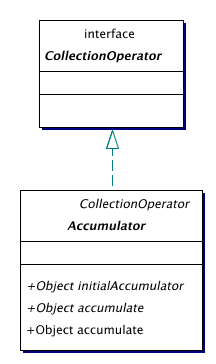
|
|||||||||
| PREV CLASS NEXT CLASS | FRAMES NO FRAMES | ||||||||
| SUMMARY: INNER | FIELD | CONSTR | METHOD | DETAIL: FIELD | CONSTR | METHOD | ||||||||
java.lang.Object | +--org.jutil.java.collections.Accumulator
A class of objects that accumulate over a collection.

The Accumulator class is the general class for visiting a collection while passing some object to the next element. The original collection remains unchanged. In relational algebra, this is aggregation.
The initial object is returned by the initialAccumulator()
method and passed to the accumulate(Object element, Object acc) method.
This method then returns the object to be given to the next element and so
on. The object returned by the visit of the last element of the collection
is returned to the user. The accumulation is started by invoking the
accumulate(Collection
collection) method.
An example of an accumulation is shown below. It is used to calculate the state of a list of components based on the state of its components. The traditional code is also shown.
Iterator iter = collection.iterator();
MyType myAccumulator = (* initial value *);
while(iterator.hasNext()) {
MyType element = (MyType) iter.next();
myAccumulator = (* accumulation of element and myAccumulator *);
}
Accumulator class.
MyType myAccumulator =
(MyType) new Accumulator() {
public Object initialAccumulator() {
return (* initial value *);
}
public Object accumulate(Object element, Object acc) {
return (* accumulation of element and myAccumulator *);
}
}.accumulate(collection);
MyType myAccumulator =
(MyType) new Accumulator() {
/oo
o also public behavior
o
o post (* preconditions for accumulate *);
o
o public model boolean isValidElement(Object element);
oo/
/oo
o public behavior
o
o post \result = (* initial value *);
oo/
public Object initialAccumulator() {
return (* initial value *);
}
/oo
o public behavior
o
o post \result = (* accumulation of element and myAccumulator *);
oo/
public Object accumulate(Object element, Object acc) {
return (* accumulation of element and myAccumulator *);
}
}.accumulate(collection);
The Jutil.org version requires slightly more code, but is easier to understand than the traditional code because there are no control statements anymore.
| Field Summary | |
static java.lang.String |
CVS_REVISION
|
| Constructor Summary | |
Accumulator()
|
|
| Method Summary | |
abstract java.lang.Object |
accumulate(java.lang.Object element,
java.lang.Object acc)
This method is called for each element in the collection we are accumulating. |
java.lang.Object |
accumulate(java.util.Collection collection)
Perform the accumulation defined in public Object accumulate(Object element, Object acc) for each
element of |
abstract java.lang.Object |
initialAccumulator()
Subclasses should implement this method to return the initialized accumulator. |
| Methods inherited from class java.lang.Object |
clone, equals, finalize, getClass, hashCode, notify, notifyAll, toString, wait, wait, wait |
| Methods inherited from interface org.jutil.java.collections.CollectionOperator |
isValidElement |
| Field Detail |
public static final java.lang.String CVS_REVISION
| Constructor Detail |
public Accumulator()
| Method Detail |
public abstract java.lang.Object initialAccumulator()
Subclasses should implement this method to return the initialized accumulator.
This method is called at the start of the accumulation. The result will be used
in the application of public Object accumulate(Object element, Object acc)
for the first element.
public abstract java.lang.Object accumulate(java.lang.Object element,
java.lang.Object acc)
This method is called for each element in the collection we are accumulating.
Subclasses should implement this method to process
The result is the accumulator that will be used for the next element of the collection to process.
. //MvDMvDMvD : names aren't clear : accumulator is not an Accumulator
element - The object the method will process and change the accumulator with.acc - The accumulator for the accumulation.
For the first element to be processed, the result of initialAccumulator
is used. For the other elements, the result of this method applied on
the previous element is used.
public final java.lang.Object accumulate(java.util.Collection collection)
throws java.util.ConcurrentModificationException
Perform the accumulation defined in
public Object accumulate(Object element, Object acc) for each
element of public Object initialAccumulator() is used as accumulator.
For the other elements, the result of the application of
public Object accumulate(Object element, Object acc) on the
previous element is used as accumulator.
The contents of
The result of this method is the object returned by the application of
public Object accumulate(Object element, Object acc) on the
last element of the collection to be processed.
collection - The collection to perform this accumulation on. It will not be changed.
This can be null, in which the initial accumulator is returned.
|
|||||||||
| PREV CLASS NEXT CLASS | FRAMES NO FRAMES | ||||||||
| SUMMARY: INNER | FIELD | CONSTR | METHOD | DETAIL: FIELD | CONSTR | METHOD | ||||||||